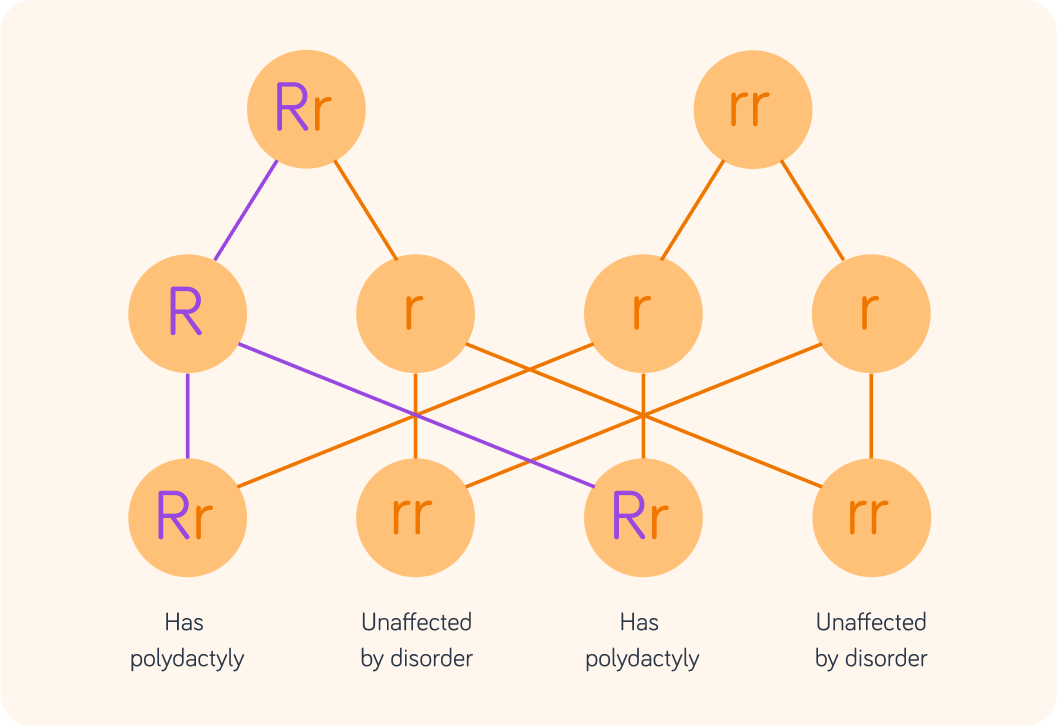YOU ARE LEARNING:
Inherited Disorders

Inherited Disorders
Inherited disorders include polydactyly and cystic fibrosis. For some inherited disorders, embryonic screening can be provided, but this can raise ethical, social and economic issues.
Some disorders are inherited. What do you think we actually mean when we say they are inherited?

Inherited disorders are caused by the inheritance of certain alleles.
One inherited disorder is cystic fibrosis. It is a disease that affects the cell membranes in the lungs and digestive system. Another one is polydactyly. The root of the word -dactyl means "fingers", but can also be used to refer to "toes". What do you think polydactyly is?

Look at this genetic diagram of polydactyly. What can be said about the disorder?
A) It's caused by a recessive allele. B) It's very rare in the population. C) It's caused by a dominant allele.


If one parent has the disorder, what is the chance an offspring might have it too?
A) 25% B) 50% C) 75%


Cystic fibrosis, unlike polydactyly, is caused by a recessive allele. So, which genotypes will cause cystic fibrosis?

If someone has the genotype Ff for cystic fibrosis, what are they called?

Can you be a carrier of polydactyly?

For some disorders, cystic fibrosis included, embryos can be screened to see if they will have the disease.
That is, there will be a test done to determine if they will have the disease or not.
Mind you that some people will think of this as quite controversial.
During in vitro fertilisation (IVF)...
embryos are fertilised externally from the body, then implanted into the womb. If alleles are found which would cause a disorder, it may lead a potential embryo to be discarded.
For embryos already in the womb...
embryo screening can influence a decision of the parents to end the pregnancy.
There are arguments both for and against embryonic screening. Let's have a look at those against first.
Destroying embryos with disorders suggests these people are less worthy of life than people without the disorders.
This causes preconceptions, or assumptions, to be made about people living with disorders.
Screening may get out of hand.
People might start wanting to screen their embryos to see if they look a certain way (e.g. blue eyes), or if they will be intelligent, athletic, etc.
Lastly, do you think screening is affordable or expensive?
A) Affordable B) Expensive
Answer A or B.

Now, let's have a look at some of the arguments for embryonic screening:
It will help to stop people suffering.
Embryos might develop into people with crippling disorders, pain and short life spans. Screening can stop people having to live with such diseases.
Treating disorders costs a lot of money.
If these embryos were avoided, it would save the Government and taxpayers a lot of money.
Finally, there are laws set in place that regulate embryo screening.
This is to stop embryonic screening happening for unimportant traits such as eye colour.
Do you think, if people want to, they can screen embryos to see their gender before they develop, so parents can choose which gendered offspring they have? Answer yes or no.

You can use this information to make up your own mind about embryonic screening - there is no right or wrong opinion. However, it is important to consider both sides of the argument, and take different people's views on life into account.
